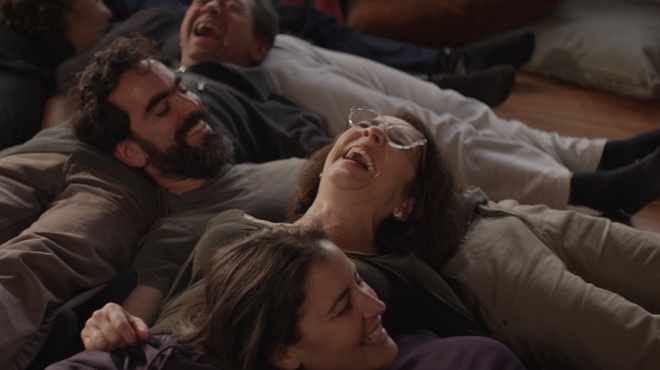GLORIA
Roadside Attractions
Director: Sebastián Lelio
Screenwriter: Sebastián Lelio, Gonzalo Maza
Cast: Paulina Garcia, Sergio Hernández, Diego Fontecilla, Fabiola Zamora, Coca Guazzini, Hugo Moraga
Screened at: Review 2, NYC, 12/11/13
Opens: January 24, 2014
How many movies have you seen with their title characters inhabiting every frame? I mean every frame! Sebastían Lelio provides us with one of those rare specimens which, in addition to being virtually unique does not give such a role to someone looking like Rachel McAdams or Amy Adams. But who needs such hot looks when you can contribute such a powerful performance? The Gloria of the title is Chilean but is someone that no small number of American women can identify with, given the incredible rates of divorce prevalent in our parts. She’s middle aged, fifty-eight to be precise, she wears oversized glasses though the film does not take place in the 1980s, and she has not given up on men. Not yet, not until she meets the one guy who may be more than the typical one-night stand with which she indulges herself by “coming there often” to a singles bar with a dance floor in Santiago, Chile.
Sebastián Lelio, the Chilean director, is best known for “La sagrada familia,” about a self-centered father and a disoriented mother awaiting the arrival of their son’s first girlfriend, a brash woman whose relationship with her boyfriend’s dad is not entirely familial. With “Gloria,” Lelio, who co-wrote the screenplay with Gonzalo Maza and who situates the drama in Santiago and the beach resort of Viña del Mar, hones in on the title figure (Paulina García), who meets Rololfo Fernández (Sergio Hernández), supposedly seven years older and who looks like Shimon Peres. Just when it looks as though this heretofore sole woman has found her soul mate, he turns out to be mighty strange, a divorcée with a co-dependency relationship with her daughters. When a member of his brood calls, which is frequently, he has a habit of disappearing without a word to his date. In one scene at a classy restaurant in Viña del Mar, this rich guy who owns an amusement part in Santiago, excuses himself from the table but not to go to the men’s room. He’s simply outta there. When she takes him to her son’s birthday party where her ex-husband is in attendance, he…disappears.
This brings us to why director Lelio puts Gloria in every frame. He wants us to get into her skin…not in the way that Rodolfo does, but in our heads, to see what it’s really like to be divorced and middle-aged, and it’s not pretty. She’s full of life, she probably considers herself to be no different in pep than when she was thirty, and does not understand why it’s so difficult to find Mr. Right. It really shouldn’t be, considering how many divorcées are floating around all over the West. But you can take all the yoga classes you want, and she does indulge in a class taught by her daughter, Ana. You can go every night to a singles club. But people of a certain age have responsibilities. They may be supporting ex-wives and children. They may be emotionally connected to their former families. They are simply not available as they were before they took on the emotional and financial burdens of college students.
“Gloria” features a stirring performance from Paulina García, who has already won the Silver Bear at the Berlin International Film Festival for Best Actress and was shown at prestigious festivals in New York and Toronto. She may well pile up some more prizes. But as a whole, the film is hurt by a banal screenplay, with unsurprising dialogue and bearing emotional weight only by the performance rather than by an intriguing story.
Rated R. 110 minutes © 2013 by Harvey Karten, Member, New York Film Critics Online
Story – C+
Acting – A-
Technical – B
Overall – B

